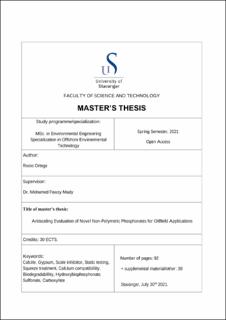| dc.description.abstract | Scale formation consists of an accumulation of mineral deposits, affecting fluids flow. It is a major flow assurance problem in the oilfield industry and can occur anywhere along water paths, from injectors through the reservoir to surface equipment. Areas such as the North Sea are highly prone to scale formation. Scale inhibitors (SIs) are commonly used to prevent the formation of these precipitates. Current commercially available SIs provide good inhibition efficiency but lack other important characteristics that must be considered before their application in the field, such as calcium tolerance, thermal stability, and biodegradability. Therefore, the principal aim of this research was to evaluate the antiscaling performance of novel non-polymeric phosphonated SIs derived from alendronic acid and fosfomycin as starting compounds.
A series of hydroxybisphosphonates-bearing phosphonate (SI-2), sulfonate (SI-3 and SI-5) and carboxylate (SI-4, SI-6, and SI-7) groups were synthesized from the well-known non-toxic bone targeting drug, alendronic acid (SI-1). A second set of SIs with nitrogen-free phosphonate groups (SI-9 and SI-10) were synthesized from the commercially available antibiotic fosfomycin (SI-8). Inhibition performance against calcite and gypsum scales was evaluated using static bottle tests based on the NACE Standard TM0374-2007. Compatibility with up to 50000 ppm Ca2+ ions was evaluated. Thermal stability was assessed at 130oC under anaerobic conditions over 7 days. Estimation of biodegradability was carried out by following the OECD 306 closed bottle method protocol.
Results showed that SI-4, SI-7, and SI-10 exhibit good to excellent gypsum and calcite inhibition performance. SI-3 and SI-5 presented good calcite inhibition but are not efficient against the gypsum scale. After thermal aging at 130oC for 7 days, SI-2 and SI-7 performance remained stable against gypsum and calcite scales, while SI-5 gave a stable performance only against the calcite scale. All proposed SIs from SI-2 to SI-7 exhibited an improvement in calcium compatibility in contrast to the parent compound SI-1. Furthermore, SI-5, SI-8, and SI-9 remained as the tested SIs most tolerant to high calcium concentrations, followed by SI-4 and SI-7. Biodegradability of all compounds resulted very low, not complying with our preliminary expectations.
This project serves as a contribution to the production chemistry field and highlights the success of synthesizing new non-polymeric gypsum and calcite scale inhibitors with good calcium compatibility and thermal stability. However, further studies and modifications are needed to improve biodegradability and evaluate the fate of these chemicals in the environment. The difficulty of developing production chemicals that can fulfill all the gaps for adequate performance in the field as well as complying with environmental regulations remains an ongoing challenge for researchers. | |
